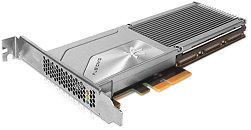- Joined
- Oct 9, 2007
- Messages
- 47,857 (7.38/day)
- Location
- Dublin, Ireland
| System Name | RBMK-1000 |
|---|---|
| Processor | AMD Ryzen 7 5700G |
| Motherboard | Gigabyte B550 AORUS Elite V2 |
| Cooling | DeepCool Gammax L240 V2 |
| Memory | 2x 16GB DDR4-3200 |
| Video Card(s) | Galax RTX 4070 Ti EX |
| Storage | Samsung 990 1TB |
| Display(s) | BenQ 1440p 60 Hz 27-inch |
| Case | Corsair Carbide 100R |
| Audio Device(s) | ASUS SupremeFX S1220A |
| Power Supply | Cooler Master MWE Gold 650W |
| Mouse | ASUS ROG Strix Impact |
| Keyboard | Gamdias Hermes E2 |
| Software | Windows 11 Pro |
Fusion-io recently announced that its VSL software subsystem and four 1.2 TB Fusion ioDrive2s integrated into a single 64-core AMD Server were able to achieve 1.11 million transactions per second in a Microsoft SQL Server database. The demonstration delivered the data throughput projected to be required to run all credit card transactions on the planet, underlining new solutions for powering efficiency in retail data processing as the 2011 holiday shopping season kicks off with record sales.
"Today's modern CPUs cannot be fed data fast enough with old approaches to application architecture," said Thomas Kejser, SQL Server Customer Advisory Team enterprise database specialist. "To fully leverage the possibilities of the NAND flash revolution in a way that utilizes the hardware, IT professionals need to understand the properties of what we use to build our systems. For example, low latency architecture that uses NAND flash as part of the memory hierarchy helps avoid bottlenecks by integrating close to the CPU for low latency application performance, which is why Fusion-io was selected for this high scale demonstration."

In the demonstration, inserts were done on 150 billion wide rows, into a single database table in Microsoft SQL Server, ultimately resulting in 1.1 million singleton inserts per second figure. The same test was run with update statements, achieving 2.5 million updates per second. Translating this throughput number to simplified credit card transactions, using the system in the testing, one transaction is one debit, one credit, and one update of account balance. When applied to daily transaction requirements, this amounts to approximately 25 billion simplified transactions per day. To put the transaction number into perspective, this is equivalent to all the credit card transactions projected to be made daily by every individual on the planet from now until 2050, when it is expected that the world will be inhabited by nine billion people.
"Given how consumers are embracing online shopping, especially on Cyber Monday and even Black Friday, we believe this achievement showcases how Fusion-io can help meet demand for servicing more digital transactions with an efficient, rapid and reliable solution," said Neil Carson, Fusion-io Chief Technology Officer. "The transaction rates achieved in these tests demonstrate the high scalability and efficiency of today's Microsoft SQL Server databases when powered by Fusion-io."
For more information, visit the Fusion-io website.
View at TechPowerUp Main Site
"Today's modern CPUs cannot be fed data fast enough with old approaches to application architecture," said Thomas Kejser, SQL Server Customer Advisory Team enterprise database specialist. "To fully leverage the possibilities of the NAND flash revolution in a way that utilizes the hardware, IT professionals need to understand the properties of what we use to build our systems. For example, low latency architecture that uses NAND flash as part of the memory hierarchy helps avoid bottlenecks by integrating close to the CPU for low latency application performance, which is why Fusion-io was selected for this high scale demonstration."

In the demonstration, inserts were done on 150 billion wide rows, into a single database table in Microsoft SQL Server, ultimately resulting in 1.1 million singleton inserts per second figure. The same test was run with update statements, achieving 2.5 million updates per second. Translating this throughput number to simplified credit card transactions, using the system in the testing, one transaction is one debit, one credit, and one update of account balance. When applied to daily transaction requirements, this amounts to approximately 25 billion simplified transactions per day. To put the transaction number into perspective, this is equivalent to all the credit card transactions projected to be made daily by every individual on the planet from now until 2050, when it is expected that the world will be inhabited by nine billion people.
"Given how consumers are embracing online shopping, especially on Cyber Monday and even Black Friday, we believe this achievement showcases how Fusion-io can help meet demand for servicing more digital transactions with an efficient, rapid and reliable solution," said Neil Carson, Fusion-io Chief Technology Officer. "The transaction rates achieved in these tests demonstrate the high scalability and efficiency of today's Microsoft SQL Server databases when powered by Fusion-io."
For more information, visit the Fusion-io website.
View at TechPowerUp Main Site








